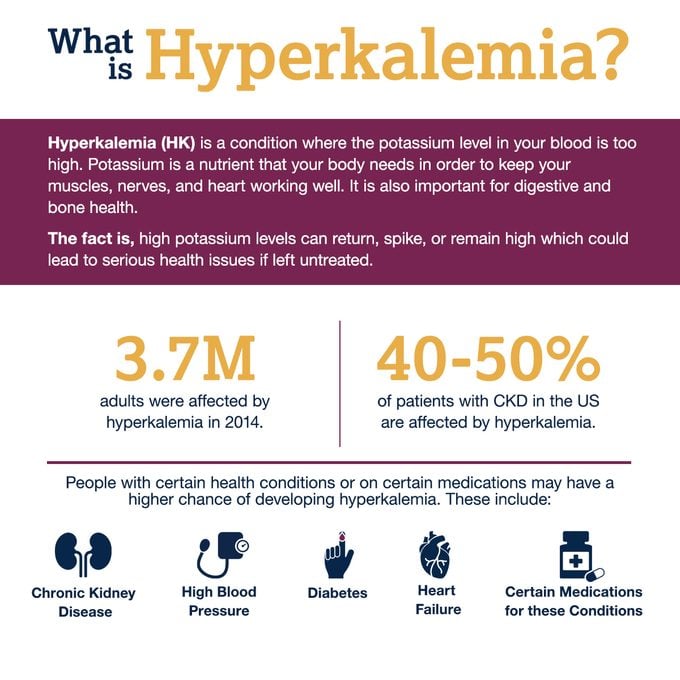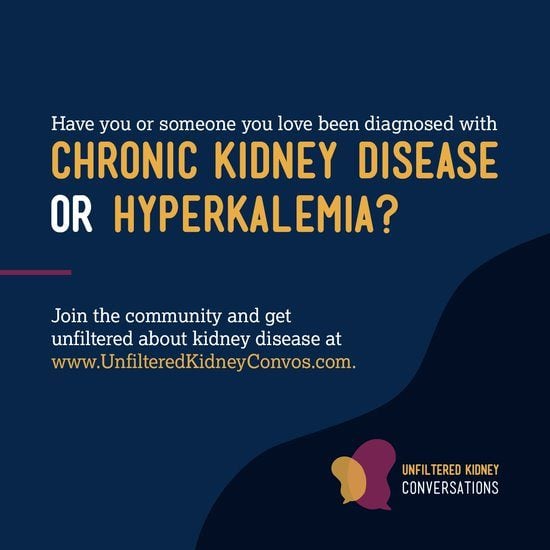Hyperkalemia (HK), also known as high potassium, is a condition that occurs when potassium levels in the blood are higher than normal. People living with chronic kidney disease (CKD) are at an increased risk of HK because their kidneys may not be able to remove excess potassium from the blood.
Read on to learn the five things you need to know about CKD and high potassium.
1. Understanding Hyperkalemia and its Connection to CKD
The kidneys work as filters for the body, and their job is to remove excess minerals, waste and fluid to keep our bodies healthy. When someone has CKD it means their kidneys are damaged and may not be able to filter blood the way they should.
People living with CKD are at an increased risk of HK because their kidneys may not be able to remove excess potassium. Even though many times there are no symptoms, too much potassium in the blood can cause irregular heartbeats, muscle weakness, numbness or tingling, or, in some cases, even death. An estimated 37 million Americans are living with CKD and up to 40-50% of them are affected by HK.

2. How to Know if You or a Loved One are at Risk for Hyperkalemia
HK is not only associated with CKD. People living with other conditions such as high blood pressure, diabetes or heart failure or on certain medications to treat these conditions may have a higher chance of developing HK. If you have any of these conditions, it’s important to talk to your doctor about monitoring your potassium levels.
3. You Can Learn Your Potassium Level with a Simple Blood Test
The only way to know if you have HK is for your doctor to order a blood test. Generally, your potassium level is normal if it is between 3.5 and 5.0 mmol/L (millimoles per litre). HK occurs when your blood potassium level is above 5.0 mmol/L.*
It’s important to remember your results only show the amount of potassium that was in your blood at the time you had the test. This is because your potassium level depends on:
- How well your kidneys are working
- How much of it you are getting in what you eat and drink each day
- If you are taking certain medicines that can affect your potassium level
- If you are taking certain medicines that lower potassium as prescribed by your doctor
The fact is, high potassium levels can return, spike, or remain high which could lead to serious health issues if left untreated, so it’s important to talk to your doctor to better understand your lab results and options for managing HK that are right for you.
4. There Are Different Options to Help Manage Hyperkalemia
If you have HK, your doctor may recommend treatment options such as lowering potassium in your diet, changing medicines that might cause hyperkalemia, or taking medicines that have been shown to remove potassium from your body. However, reducing potassium in your diet may restrict foods that are part of a heart-healthy diet and contradict with certain meal-centric cultural celebrations that include ingredients like avocados, tomatoes, or dark chocolate. In addition, a recent study published in the Journal of Renal Nutrition found that reducing dietary potassium in people with chronic kidney disease may keep them from getting important healthy nutrients from fruits and vegetables.
It’s important to talk to your doctor about CKD and HK and options that are right for you. Check out the doctor discussion guide on unfilteredkidneyconvos.com to help you ask the right questions at your next appointment.
5. There is a Community Dedicated to Those Living with CKD and Hyperkalemia
If you or a loved one has been diagnosed with CKD or HK, it’s important to know you are not alone. Unfiltered Kidney Conversations (UKC) is a community that seeks to help and inspire everyone affected by CKD and HK, whether you’re living with it or supporting someone you love. We’re a place to get information and resources, because we believe knowledge is power when it comes to your health.
Visit unfilteredkidneyconvos.com to join the community. You can also join us on Facebook @UnfilteredKidneyConversations for more information and support from fellow CKD warriors.

